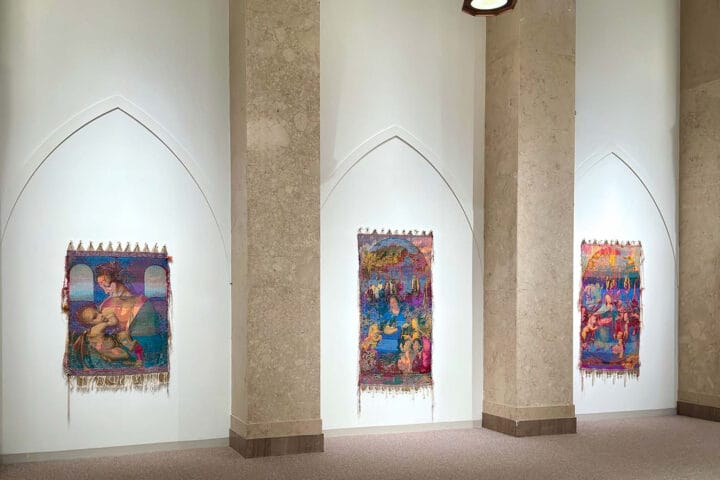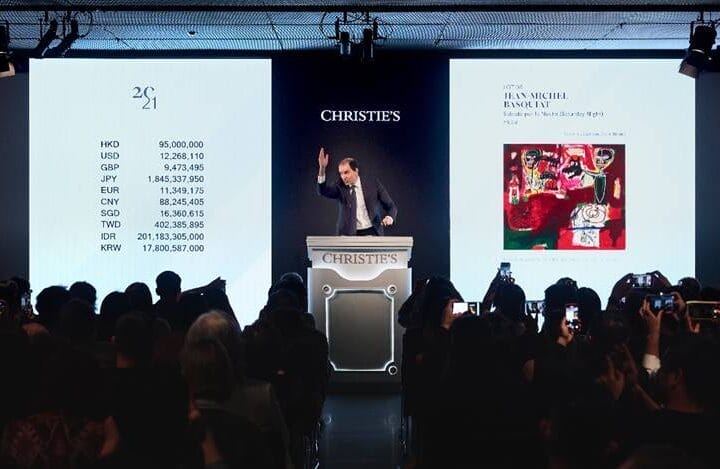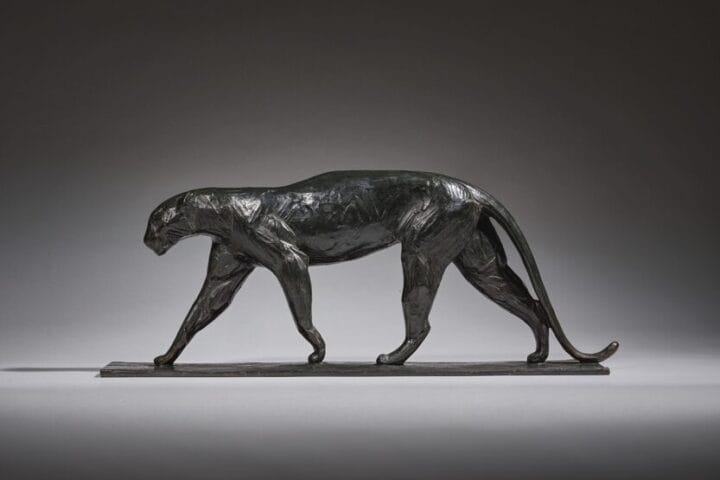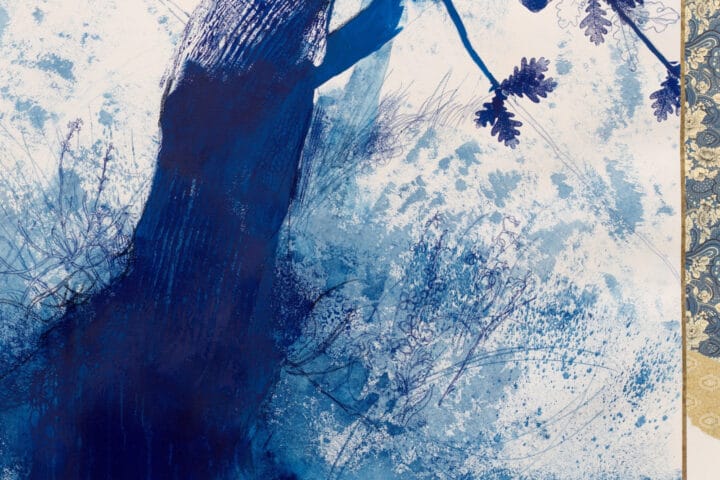CÉLINE CONDORELLI: ARTIST IN RESIDENCE
13 September 2023 – 7 January 2024
Visitors become part of a new work of art at the National Gallery – an installation on the floor of one of its most imposing rooms – by being invited to recline and admire a dramatic new 25-by-64-metre textile sculpture on the ceiling. At the same time, through a new audio work, they can hear field recordings and everyday voices of Trafalgar Square connecting the inside of the Gallery with the world outside its front door. The installations are by Artist in Residence Céline Condorelli who is putting the Gallery’s visitors and its various behind-the-scenes activities at the heart of this exhibition. Céline Condorelli is the National Gallery’s new Artist in Residence for 2023. Condorelli is the third Artist in Residence to be chosen since the launch of the Gallery’s new Modern and Contemporary Programme, following the first appointment of Rosalind Nashashibi in 2019 and Ali Cherri in 2021.
THE CREDIT SUISSE EXHIBITION: FRANS HALS
30 September 2023 – 21 January 2024
This exhibition, the first major retrospective of Hals in more than thirty years, means a new generation can discover why he deserves his place as one of the greatest painters in Western art. Some fifty of Hals’s finest works will be brought together, including the exceptional, first-ever loan of his most famous picture, The Laughing Cavalier (1624), from the Wallace Collection. From small works to large group portraits, genre scenes, and marriage portraits reunited for the first time from international collections, visitors will see the very best of his life’s work. Exhibition organised by the National Gallery and the Rijksmuseum, Amsterdam with the special collaboration of the Frans Hals Museum, Haarlem.
DISCOVER LIOTARD AND THE LAVERGNE FAMILY BREAKFAST
16 November 2023 – 3 March 2024
For the first time in 250 years, this exhibition will reunite the pastel masterpiece The Lavergne Family Breakfast by Swiss artist Jean-Etienne Liotard (1702 – 1789), painted in Lyon in 1754, with the painted version in oil he completed in London almost 20 years later. This is the second in a series of ‘Discover’ exhibitions staged in the National Gallery’s Sunley Room which explore well-known paintings in the collection through a contemporary lens. The exhibition will introduce viewers to the delicate medium of pastel, showcasing both the raw materials and a selection of Liotard’s highly finished works in pastel.
PESELLINO: A RENAISSANCE MASTER REVEALED
7 December 2023 – 10 March 2024
This is the first ever exhibition dedicated to the Renaissance painter Francesco Pesellino (c.1422 – 1457), whose notable career was cut short by his death at thirty-five and the difficulty of attribution have made him one of the greatest Renaissance painters that few people have heard of. This exhibition will seek to remedy that by presenting a monographic view of Pesellino’s achievements through his works in the National Gallery Collection and a number of key loans. The National Gallery is uniquely placed to introduce Pesellino’s work to a broader audience, given the presence in its collection of two of his undisputed masterpieces; two cassone panels with Stories of David, about 1445-55, and the Pistoia Trinity altarpiece, 1455-60.
NATIONAL TREASURES
10th May 2024 – September 2024 (closing dates may vary)
Twelve museums and galleries, in each nation of the UK and each region of England, will receive a treasured painting from the National Gallery’s collection, and will be programming exhibitions, events, and working with their local communities to celebrate and learn about their painting as part of National Treasures. National Treasures is part of the NG200 celebrations and will see works such as The Fighting Temeraire travelling to the Laing Art Gallery, Newcastle and Renoir’s The Umbrellas travelling to the Leicester Museum & Art Gallery.
THE LAST CARAVAGGIO
18 April – 21 July 2024
The Last Caravaggio (18 April – 21 July 2024), will present Caravaggio’s last painting, not seen in the UK for nearly 20 years. The Martyrdom of Saint Ursula, 1610, generously lent by the Intesa Sanpaolo Collection (Gallerie d’Italia – Naples) will be displayed alongside another late work by the Italian artist from the National Gallery Collection, Salome receives the Head of John the Baptist, about 1609–10. This exhibition will present an opportunity to explore Caravaggio’s late paintings, the representation of violence in his work, and to reflect on violence in our own times. The programming and activity around this project will shed light on the figure of Saint Ursula, allowing visitors to explore her story.
DISCOVER DEGAS AND MISS LA LA
6 June – 1 September 2024
As part of the National Gallery’s free ‘Discover’ series, Degas’s Miss La La at the Cirque Fernando, 1879, takes centre stage. This landmark Impressionist painting records an extraordinary moment and features a remarkable sitter – the circus artist Miss La La, or Anna Albertine Olga Brown (1858-1945). This exhibition will take a closer look at Degas’ painting and will reveal new information about her life and career to the public for the first time. Featuring new material, from rare, hitherto untraced drawings of her by Degas, to entirely unpublished photographic portraits, the exhibition casts a frank, direct light on Anna Albertine Olga Brown, while inviting us to look afresh at the painting Miss La La at the Cirque Fernando.
SUMMER ON THE SQUARE
01 August – 01 September
The free festival returns to Trafalgar Square, programmed with and for children, young people and their families to engage new and diverse audiences. The festival is designed to unlock the nation’s creativity and bring the collection to the streets of Westminster.
As part of NG200, for the first time Summer On The Square will include an exhibition display of Take One Picture, our flagship programme for primary schools. Every year, we take one painting from the collection to inspire cross-curricular work in classrooms – this year the painting, as selected by children, is Rousseau’s Surprised!.
KATRINA PALMER: ARTIST IN RESIDENCE
Autumn 2024
Katrina Palmer, a London-born and based artist, is the National Gallery’s new Artist in Residence for 2024. Palmer has been invited to respond to the collections of the National Gallery and Touchstones Rochdale.
The award is a collaboration with the Contemporary Art Society, generously supported by Anna Yang and Joseph Schull, who will acquire an artwork produced during the residency for this year’s Partner Museum, Touchstones Rochdale. Palmer’s work explores a range of spaces from island quarries to offices, prisons to coastal landscapes. Using objects, sound, writing and drawing she investigates the possibilities of sculpture through text and language. Previous projects have engaged with concepts of absence and dislocation within historic sites.
VAN GOGH: POETS AND LOVERS
14 September 2024 – 19 January 2025
To mark its 200th anniversary the National Gallery will stage its first exhibition of the paintings of Vincent Van Gogh in Autumn 2024. Van Gogh: Poets and Lovers will also mark the centenary of the Gallery’s acquisition of the artist’s Sunflowers and Van Gogh’s Chair (1888), two of its most famous pictures, in 1924.
Groups of Van Gogh’s most ambitious canvases and works on paper will explore the artist’s creative process and his sources of inspiration. Dwelling on Van Gogh’s time in Arles and Saint-Rémy in the South of France (1888 -1890), the exhibition investigates the artist’s fascinating practice of turning the places he encountered into idealised spaces in his art, thus crafting a deeply resonant and poetic framework for his oeuvre.
DISCOVER CONSTABLE AND THE HAY WAIN
17 October 2024 – 2 February 2025
The National Gallery will stage Discover Constable and The Hay Wain, devised around The Hay Wain (1821) by John Constable (1776 –1837). This will be the first loan exhibition held at the National Gallery on this artist and the first to explore the social, political and artistic context of the English landscape at the time of The Hay Wain’s production. The exhibition will explore how the English landscape was changing physically and politically at the turn of the 19th-century, and how this was understood and represented (or not) by artists at this time, as well as looking at where Constable was in his career in 1821 when he produced The Hay Wain and his process of building final works from sketches and studies produced over many years.










